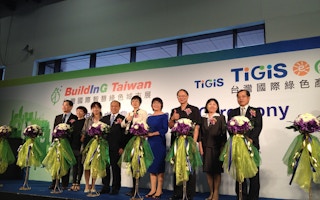Taiwan’s green industry continues to boom as the sector becomes more important to the state’s national development, said leaders at the opening of the Taiwan International Green Industry Show (TiGiS) on Wednesday.
Exports from Taiwan’s green industry last year were valued at US$40.5 billion, making up 13.5 per cent of total exports. This signifies how the green industry has the potential to grow, said Chun-Fu Chang, director general of the Bureau of Foreign Trade, Ministry of Economic Affairs (MOEA), who led the opening ceremony held at the Taipei World Trade Center.
Taiwan aims to promote an industry of sustainable companies and drive energy conservation, particularly with this event, he added.
Currently in its fifth edition, TiGiS is a platform and exhibition for businesses, universities, trade associations and the government to showcase their green initiatives, products and services.
The four-day show covers a wide spectrum of areas under the green industry banner, from wind energy to water treatment and recycling, and from smart grids to electric vehicles.
“
The green industry must also have “vertical and horizontal integration” … the country cannot focus on one sector alone, and therefore, should include various aspects of the green industry and other such firms that provide solutions to lessen environmental impact.
Kitty Wong, Expo Union Corporation president
This gathering of local and foreign participants also features the 3rd Taiwan International Smart Green City Expo (BuildInG Taiwan) and takes place alongside the Taiwan International Photovoltaic Exhibition.
There are 183 companies and 317 booths, including a dedicated pavilion for different state trade and investment offices from the United States, noted Peter Huang, president and chief executive officer of the Taiwan External Trade Development Council or TAITRA, the organisation primarily responsible for the TiGiS and BuildInG Taiwan.
Translated from Chinese, he said, “We want to show the world the importance of energy conservation and sustainability.”
Taiwan currently ranks sixth place in green competitiveness around the world, noted Dr Lih-Chyi Wen, deputy director of the Green Trade Project Office, MOEA.
This is according to a study conducted by the Switzerland-based IMD World Competitiveness Center, which produces yearly rankings of nations based on their competitiveness and economies.
Dr Wen added that Taiwanese businesses need government support in order to promote and succeed in the global market.
The green industry must also have “vertical and horizontal integration”, said Kitty Wong, president of Expo Union Corporation, a co-organiser of the event. She explained that the country cannot focus on one sector alone, and therefore, should include various aspects of the green industry and other such firms that provide solutions to lessen environmental impact.
Wong did note that the government is now including sustainability in its government development strategy, which is key to improving Taiwan’s cities.
In the booth of the Taipei city government, one of the highlights of the TiGiS and BuildInG Taiwan exhibition, several programmes were on display showing the city’s different efforts to reduce carbon emissions. The booth centred on a theme of “Low Carbon Capital of Taipei”.
On the transportation side, the city government recently introduced a bike-sharing programme called YouBike, which is intended to spur a cleaner means of traveling.
According to Lin Fang-Ling and Huang Hsun-Wei, representatives of the Taipei city government, there are currently 162 bicycle stations and 5000 bikes available for renting. Residents and visitors only need a metro card to use a bike, which can be returned to almost any point in the city.
Another example of Taipei’s eco-policies is its Neihu garbage mountain clean-up project, which is said to be the first successful example of transforming a retired landfill into a city park in Asia.
Speaking to Eco-Business on the sidelines, city government representatives said this project was started in 2006 and will be completed by next month. Over 76 tonnes of waste was separated for recycling, and those that cannot be recycled were sent to an incinerator in Bali, Indonesia.
To convert the landfill into a 16-hectare park, the land was duly analysed for contamination as well, they said.
Completing the emissions reduction mix of efforts, Taipei also has a water conservation and awareness programme, green buildings, and cloud-computing technology for the city’s health system, which will improve the public records of and medical services to the elderly and disadvantaged communities.
Huang said that trade shows such as the TiGis and BuildInG Taiwan enhance the sustainability efforts of Taipei and the rest of the country.
“Taiwan sees itself as a green, high-tech island,” added Dr Wen.

















